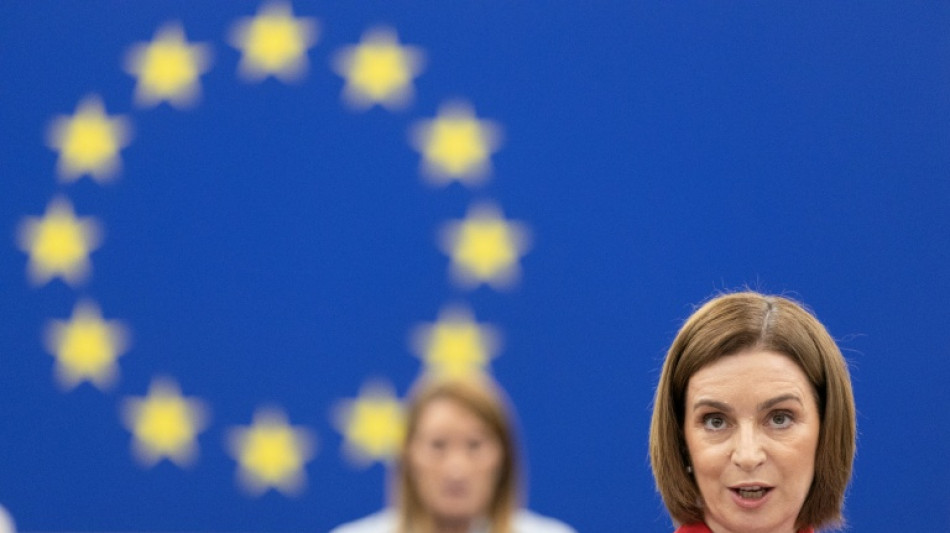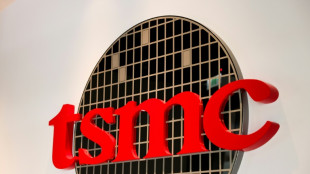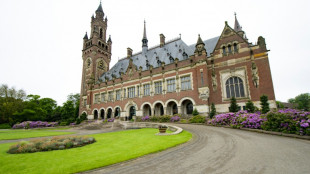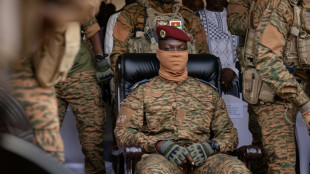

Moldovan voters face crossroads between Russia and EU
Moldovans will vote this week in tense parliamentary elections which its president has called the "most consequential" in the small country's history, as it teeters between its powerful neighbour Russia and the West.
Wedged between Ukraine -- currently fighting off a Russian invasion -- and European Union member Romania, Moldova has long been divided over closer ties with Brussels or maintaining Soviet-era relations with Moscow.
Most polls so far show President Maia Sandu's pro-EU party, in power since 2021, in the lead in the September 28 vote -- but she accuses the Kremlin of spending hundreds of millions of euros in "dirty money" to interfere in the campaign.
Analysts warn the race is far from certain.
There are growing frustrations among the population of 2.4 million over economic hardship and unfulfilled promises of reform in one of the poorest countries in Europe, as well as scepticism over Sandu's push to gain EU membership, which she launched after Moscow's 2022 invasion of Ukraine.
"To me it seems the European Union has been too present over here. So many visits, it seems like too much involvement to me," Elena Popusoi, a voter in her 50s, told AFP.
She added she preferred "friendship with Russia".
A loss for Sandu's ruling Party of Action and Solidarity (PAS) could throw up hurdles in the push towards EU integration.
"The game will be played until the very last moment," said analyst Valeriu Pasha from the think tank WatchDog.md, based in the capital Chisinau.
- 'Voter corruption' -
Ahead of the ballot, PAS leaders asked voters to overcome their "grievances and doubts" to avoid the risk of young men becoming "cannon fodder in (Russian President Vladimir) Putin's bloody, criminal wars".
Sandu has also warned that a Moscow-friendly government would be used as "a launchpad for hybrid attacks on the European Union".
The opposition, led by the pro-Russian Patriotic bloc, argues that cutting ties with Russia has slowed the country's economy.
It has promised cheap gas, higher pensions and the ban of military exercises on national soil.
"The last four years cannot be called normal," said Chisinau mayor Ion Ceban, from the opposition Alternative bloc, adding that "fear, hatred and division" were dominating.
In the lead-up to the vote, prosecutors have carried out sometimes daily searches related to what they say is "voter corruption and illegal financing of political parties".
They have published photos with stashes of confiscated dollars and euros, and audio recordings they say are of people discussing money received from Moscow.
Meanwhile, a pro-Russian bloc controlled by fugitive oligarch Ilan Shor, convicted for fraud, has been banned from participating in the poll.
Shor has promised $3,000 to Moldovans who take to the streets against the ruling party, which he has accused of "political terrorism".
Dozens of people have protested almost daily in front of a Chisinau prison asking for the release of what they deem "political prisoners", including a pro-Russian governor jailed for illegally financing Shor's party.
- Risk of instability -
Turnout will be decisive -- especially in the large and powerful diaspora, which tends to vote PAS, and in the breakaway region of Transnistria, which leans pro-Russian, analysts say.
Some 23 political parties and independent candidates are running for the 101 parliamentary seats.
If PAS comes out on top but fails to get a majority, it may need to enter a ruling coalition with a party which could end up as "a Trojan horse", sabotaging European integration from inside the government, experts say.
Pasha, the analyst, warned that any political instability following the vote would also be "quite convenient for Russian interests".
But for many Moldovans in the capital, the opportunity offered by strong links to western Europe beckons.
"I want a better future, to finish my studies abroad and come back to a Moldova I like," Livia Melnoc, 21, told AFP in Chisinau.
N.Becker--VZ


